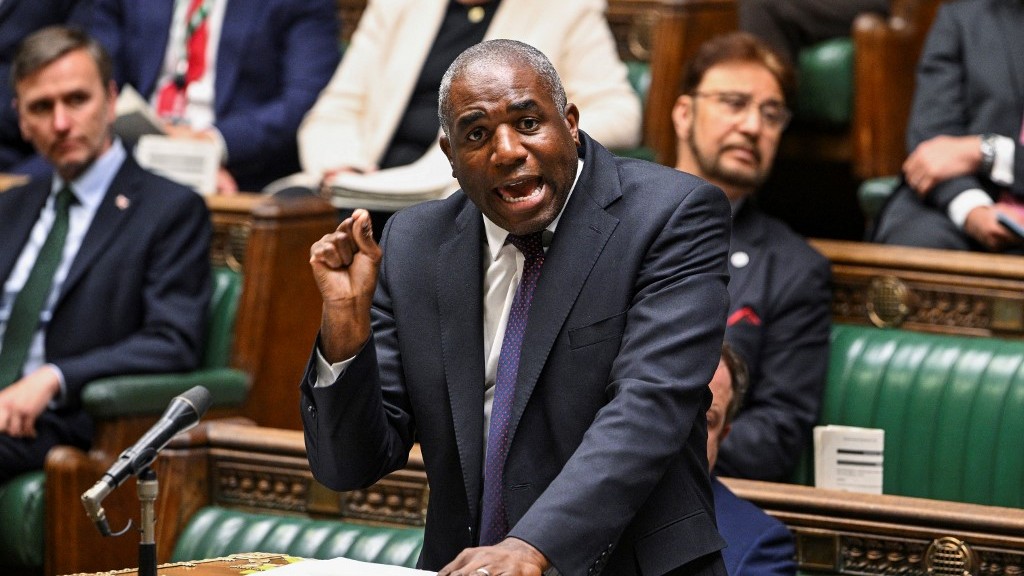Nearly 60 British MPs and peers have called for a full embargo on arms exports to Israel and for the government to be more transparent about the licences it grants for military exports.
Their demands, outlined in a 18 July letter sent to Foreign Secretary David Lammy and Business Secretary Jonathan Reynolds, come as Lammy has warned Israel of further sanctions if it does not reach a ceasefire in Gaza.
The UK joined 27 other countries, including Australia, Canada and France, to condemn Israel for depriving Palestinians of “human dignity”, and urged the Israeli government to immediately lift restriction on flow of aid.
“We’ve announced a raft of sanctions over the last few months,” Lammy told ITV’s Good Morning Britain on Tuesday.
“There will be more, clearly, and we keep all of those options under consideration if we do not see a change in behaviour and the suffering that we are seeing come to an end.”
New MEE newsletter: Jerusalem Dispatch
Sign up to get the latest insights and analysis on
Israel-Palestine, alongside Turkey Unpacked and other MEE newsletters
But those who signed the letter, including Zarah Sultana, John McDonnell, and Jeremy Corbyn, say the UK government should immediately end all arms exports to Israel or risk being complicit in genocide.
“The components which create the fighter jets that Israel has used to level Gaza are 15 percent British-made – we cannot hide from that,” said Labour MP Steve Witherden, who organised the letter.
“Without British arms export licences, these jets could not fly, they could not drop their bombs.”
Calling for answers
The letter follows an adjournment debate last month that marked the first time arms export licences to Israel had been debated in the Commons since before the 7 October 2023 Hamas-led attacks on Israel.
‘The bare minimum we can do is be fully honest about what we are sending to a state involved in the indiscriminate slaughter of civilians’
– Steve Witherden MP
The MPs and peers asked for clarity about data about UK arms exports to Israel in 2024, released by the Export Control Joint Unit (ECJU), a cross-departmental body overseeing UK export licensing for military and dual-use items.
During last month’s debate, Trade Minister Douglas Alexander said the majority of the £142m in military export licences approved in 2024 to Israel were for components that would be re-exported to third countries, including Nato allies.
But the letter says that ECJU data shows that of the £141.6m in standard individual export licences for military goods issued in 2024, more than half of the approved value appear to be intended for direct use in Israel.
“Could the government clarify how this data aligns with the minister’s claim that the majority of these licences were for re-export?” the letter asks.
Alexander also said that more than £120m – or around 85 percent of the total value of licences for military exports to Israel last year – “were for components to support exports of military items from Israeli companies to a single programme for a Nato ally”.
The MPs and peers have asked the government to clarify which Nato ally is involved, the name and nature of the programme, and when it was established.

Approved UK arms exports to Israel skyrocketed under Labour, data shows
Read More »
They have also asked for clarity about a surge in individual licences, totalling £127.6m and mostly for military radars and targeting systems, that were issued between October and December 2024, after the newly elected Labour government announced the suspension of around 30 arms licences to Israel.
Witherden said that repeated calls for greater transparency about arms exports from the government “have so far gone unanswered”.
“The bare minimum we can do is be fully honest about what we are sending to a state involved in the indiscriminate slaughter of civilians,” he said.
Last month, the High Court rejected a challenge brought by rights groups that sought to halt the export of British-made F-35 fighter jet parts indirectly to Israel, through a global supply pool, following a 20-month court battle.
In their ruling, the judges said they found that the issue was a matter “for the executive which is democratically accountable to Parliament and ultimately to the electorate, not for the courts”.

